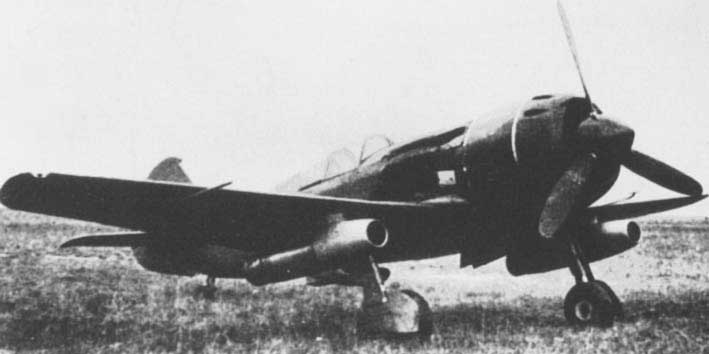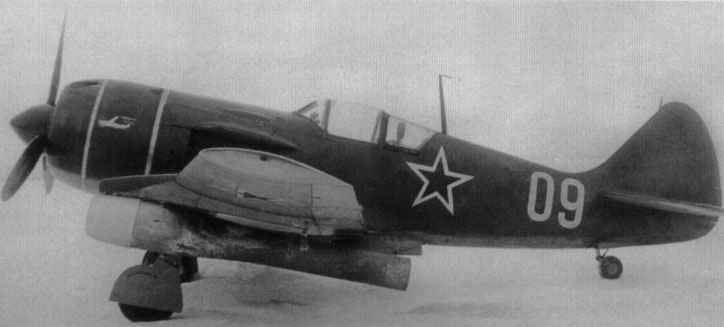

History:
As part of the Soviet philosophy of trying to get the most out of any given
design, a number of pulsejets and ramjets were fitted on to their piston engined
aircraft to try and improve the performance. Normally this was done on obsolete
aircraft, but in the case of the La-126 and La-130 this was not so, as the jet
age was dawning it was hoped (against all experience) that the fitting of jet
boosters would extend the life of these airplanes. But as with other pulse and
ramjets when not in use they made to much drag slowing the aircraft down! and
when in use they gave the aircraft the extra speed but at the cost of very high
fuel consumption. The idea was dropped with the arrival of first Soviet jets.
The La-126 was a redesigned La-7, fitted with new laminar-flow wings, a new all metal stressed skin fuselage, new canopy, better armament and many other changes, it's first flight being in 1945. In 1946 an La-126 was fitted with 2x RD-13 pulsejets under the wings (The RD-13 was a Soviet copy of the Argus As 014) to become the La-126 PVRD.
| The La-130 was a follow on development of the La-126, designed in 1944/45 by the OKB at Tbilisi and having it's first flight on the 16/6/1946. It was the basis for the La-9 of 1946 as well as it's replacement the La-11 of 1948. An La 130 fitted with 2x VRD-430 engines (The VRD-430 engine was a subsonic ramjet of a 400 mm diameter designed by M.M. Bondaryuk) under the wing to become the La-138, the aircraft was tested in March/April 1947, with a boost in top speed of 112 km/h being obtained however at the expense of high fuel consumption and severe drag when the engines were not in use. |
|
The La-9RD was a serious attempt to put a modern fighter powered with ramjet boosters in to production. At least nine aircraft were converted, first flying in mid 1947 and took part in the Tushino airdisplay of 1948. The two RD-13 pulsejets were fitted to the same hardpionts as the La-138, but the pylons extended ahead of the leading edge of the wing. The engines gave a boost of 128 km/h, but also produced severe vibration which led to the idea being abandoned. |

|
| The Soviets were not the only ones who experimented with booster jets on there piston engaged airplanes. After W.W.II the Americans fitted two Ford pulsejets (a copy of the Argus As 014) to the underneath of the wings a P-51 "Mustang" (a la' La 126) and even ramjets on the wing tips another P-51. |